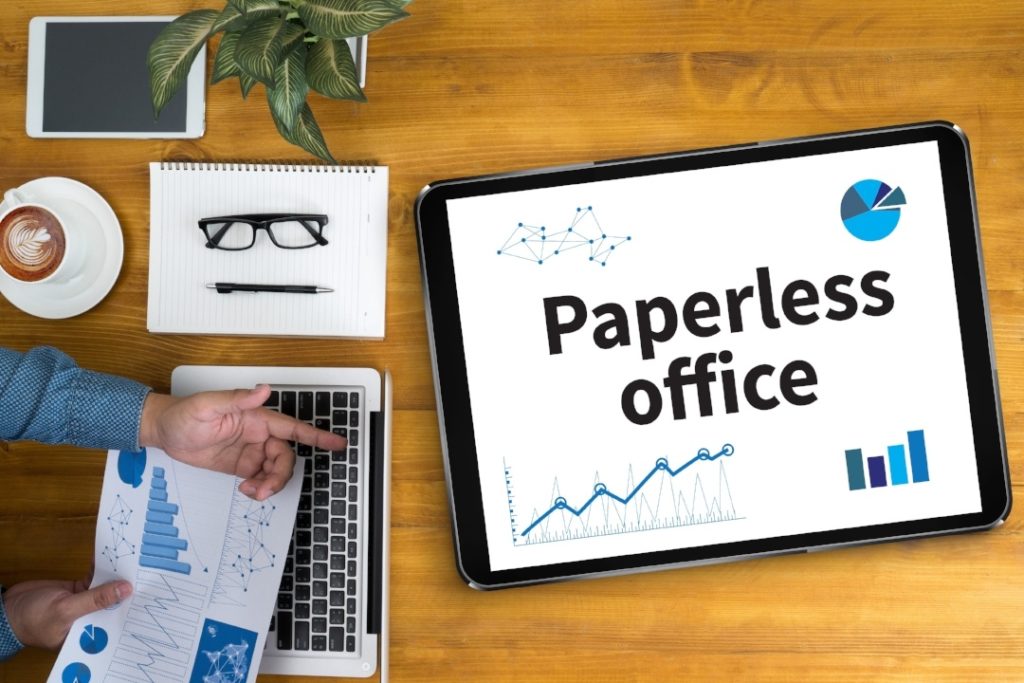Migrating to a paperless office is a long-term goal for many broker-dealers and RIAs. Most firms have used paperless processes to some degree, but many haven’t yet adopted a complete paperless office strategy.
As firms who have already gone paperless know, the benefits of running a paperless office are huge. Let’s take a look at the top 6 ways going paperless can help your firm gain a competitive advantage.
Cost Reduction
Because paper is such an ingrained part of the business, you might not consider how much it actually costs.
There’s the cost of the paper itself, which is expected to rise significantly. Then there’s the cost of printers, toner, and maintenance. File cabinets and the space they take up in an office must also be considered. Finally, you have all of the little accoutrements like file folders, pens, paper clips, and staples. The cost of all of this paper-based infrastructure can add up fast.
Maintaining paper documents also leads to several indirect costs. For one, it’s extremely labor-intensive. Employees must spend time printing, collating, and filing, which take away from other revenue-driving tasks. Furthermore, when it comes time to change office space, all of these paper documents must be moved, which makes relocation more expensive.
Going paperless eliminates most of these costs. For large organizations, the total cost savings could be huge — enough to launch that initiative that’s been sitting on hold for years, or even give everyone a nice bonus.
Faster Client Onboarding and Transaction Processing
Digital platforms designed for wealth management firms make it easier for advisors to open accounts and onboard new clients.
Paperless platforms enable client data to be imported from CRMs and other systems. This data is then automatically populated across all relevant fields, dramatically reducing the amount of manual work required for advisors. In addition, electronic signatures make it simpler for advisors to get sign-off from their clients.
Some paperless onboarding platforms also include built-in compliance tools. This helps to prevent NIGOs, which affect around 40% of paper-based submissions for some firms.
Going paperless also eliminates the mailing and faxing required by paper-based processes. Paperwork can be signed, recorded, processed, confirmed, tracked, and transmitted within minutes instead of days.
Easy Audits
One of the major advantages of a paperless office is the ability to effortlessly survive an audit.
When it comes to complying with regulations, paper documentation presents several potential pitfalls. Paper documents are more likely to be misplaced or lost. It’s also time-consuming for staff to compile all the paperwork requested by an auditor.
All of this can complicate or delay audits, frustrating auditors and putting firms in a precarious position. A paperless system eliminates these problems by making document retrieval as simple as searching a database.
Secure cloud storage ensures that documents can be easily recalled. You can call up whatever documents are requested by auditors in a matter of minutes, instead of the hours that physically pulling these files manually might take. All of this reduces disruptions to your workplace while making the auditor’s job easier.
Reduced Administrative Needs
Shifting to a paperless office also helps firms allocate resources more effectively. Administrative staff who currently spend a large portion of their time printing, copying, filing, or faxing documents can be reduced or shifted to revenue-driving roles. In addition, paperless systems give advisors more visibility into the status of their business, greatly reducing the amount of phone calls coming from the field. Some firms that have gone paperless have reported eliminating their mailroom and call center altogether.
Enhanced Security
Some cloud-based storage options use government-grade encryption to secure data and prevent breaches. Access can be carefully controlled in ways that aren’t possible with paper documents, such as ensuring only designated employees can see or edit certain forms and documents.
In addition, these paperless services can scan for malicious activity while tracking all access and edits to documents, or simply make it impossible for edits to take place at all.
Many people immediately think of data breaches when they think of cloud storage, but the truth is that paper-based processes are much less secure than most paperless ones. File cabinets can be broken into, documents left out on desks or in bags can be stolen, and items can get lost in the mail. All of these risks are eliminated by going paperless.
More Convenient Day-to-Day Operations
When documents can be accessed from any location with internet access, firms and employees gain much more flexibility. In a paperless office, back office staff have the ability to work from home. In addition, remote employees and out-of-town consultants can be used in ways that would have been impossible with a paper-based office.
For most broker-dealers and RIAs, a paperless office offers a quick return on investment that will continue to pay dividends over time. It’s not simply about keeping up with trends. Paperless processes serve to streamline operations and reduce labor and compliance costs, all while enabling firms to scale rapidly.
Interested in learning more about how Docupace can help benefit your business during its transition to going paperless? Contact us today for more information!




